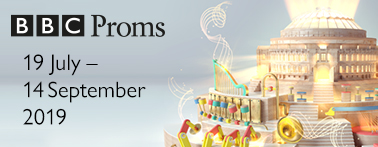
 United Kingdom BBC PROM 32 – Benjamin Beckman, Berlioz, Richard Strauss: Joyce DiDonato (mezzo-soprano), National Youth Orchestra of the USA, Brass of the National Youth Orchestra of Great Britain / Sir Antonio Pappano (conductor). Royal Albert Hall, London, 13.8.2019. (CSa)
United Kingdom BBC PROM 32 – Benjamin Beckman, Berlioz, Richard Strauss: Joyce DiDonato (mezzo-soprano), National Youth Orchestra of the USA, Brass of the National Youth Orchestra of Great Britain / Sir Antonio Pappano (conductor). Royal Albert Hall, London, 13.8.2019. (CSa)

Benjamin Beckman – Occidentalis (European premiere)
Berlioz – Les nuits d’été
Richard Strauss – An Alpine Symphony
Should one harbour any concerns about the future health of classical music, there is nothing more reassuring than to hear a concert performance by an orchestra made up of young, enthusiastic and supremely talented players. The assembled might of the National Youth Orchestra of the USA – some 131 players drawn from every corner of the United States, and gathered at the Royal Albert Hall under the direction of Sir Antonio Pappano – certainly raised the spirits. Strikingly dressed in black blazers, red trousers and sneakers, these artistic ambassadors of good will, as they are referred to in their mission statement, offered a richly coloured and musically varied programme of Berlioz and Richard Strauss.
They began with the European premiere of Occidentalis, a five-minute orchestral fanfare by 19-year-old American composer Benjamin Beckman. The work’s title is adopted from old European nautical maps which indicated the direction west of Europe, and was written to celebrate the USA as a country of immigrants who fled west from hunger and persecution in search of a better life.
A note of sunny optimism was sounded by the brass section’s opening salvo, but soon turned to uncertainty as the orchestra’s collective strings summoned a mood of restless anxiety, underlaid by a delicate membrane of percussion and accentuated with shrill bursts of woodwind. Ending on a high and joyous note, Beckman points to a new world where freedom and possibility are not yet extinct.
By contrast, the musical journey on which Berlioz embarks in his fragrantly perfumed song-cycle Les nuits d’été (‘Summer Nights’), a setting of six poems by Théophile Gautier, offers little resolution. It is a melancholy voyage in search of unattainable romantic love, which, ‘if it exists’ as the programme note puts it, ‘it is beyond our grasp, somewhere over a very distant horizon.’
Mezzo-soprano Joyce DiDonato, sensitively accompanied by a pared down orchestra, invested each song with sumptuous warmth and purity. Perfectly suited to the romantic repertoire of this period, DiDonato’s voice is capable of great power, yet its vibrato quality suggests a touching vulnerability, even at full volume. Her breath control and articulation are phenomenal too. Even in moments of utmost pianissimo, as with the final lines of ‘Le spectre de la rose’, she could be heard and understood in the furthest reaches of the Hall. DiDonato’s tender account of the lament in ‘Sur les lagunes’ (On the Lagoons) was capable of breaking the stoutest heart, while her rendition of ‘Absence’ was so intimate, it seemed to be directed individually to each member of the capacity audience.
Richard Strauss’s ten orchestral tone-poems, collectively known as An Alpine Symphony, took one on a very different journey. On one level, it’s an explicit musical depiction of a day’s climbing in the Bavarian Alps, and on another, a Nietzschean voyage of the soul. It requires the full forces of the orchestra, including an additional 16-strong brass playing as an off-stage hunting party – on this occasion drawn from the ranks of the National Youth Orchestra of Great Britain – and makes mountainous demands on the performers. All challenges were overcome by musicianship of the highest order. In ‘Sunrise’, a refined fanfare of trombones and tubas greeted the dawn to reveal a mountain range of mystical splendour. Shimmering strings effectively depicted the rising mists, and a solitary oboe, hauntingly played by Caroline Becker marked our arrival on ‘The Summit’. One could witness the enthusiasm of the unrestrained percussion section -complete with wind machine and thunder sheet – as the players unleashed a thrillingly violent ‘Thunderstorm’. As the storm abated, the orchestra’s dexterous woodwinds suggested delicate raindrops, while the strains of the Albert Hall’s mighty organ marked the final transcendent ‘Epilogue’.
After an epic Alpine excursion, Pappano and his young ambassadors of goodwill struck a diplomatic note with a poignant and well-judged encore: ‘Nimrod’ from Elgar’s Enigma Variations. Quite a few stiff upper lips in the audience wobbled, but it was the perfect way to say goodbye.
Chris Sallon
As a seasoned concert goer much nearer 80 than 70, I find I am rarely in agreement with reviewers. But in this case I must make an exception. I agree with every word – including the reaction to the playing of Nimrod as the sensitively chosen encore,